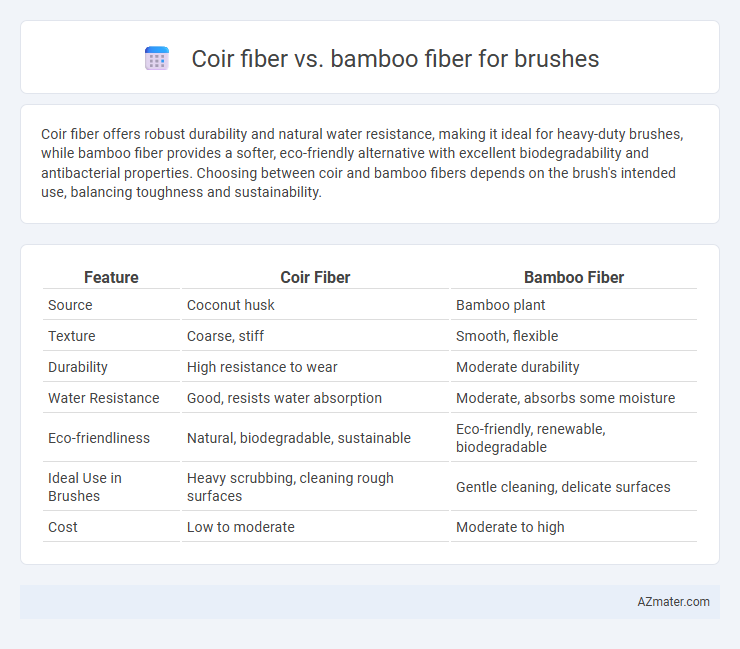Coir fiber offers robust durability and natural water resistance, making it ideal for heavy-duty brushes, while bamboo fiber provides a softer, eco-friendly alternative with excellent biodegradability and antibacterial properties. Choosing between coir and bamboo fibers depends on the brush's intended use, balancing toughness and sustainability.
Table of Comparison
| Feature | Coir Fiber | Bamboo Fiber |
|---|---|---|
| Source | Coconut husk | Bamboo plant |
| Texture | Coarse, stiff | Smooth, flexible |
| Durability | High resistance to wear | Moderate durability |
| Water Resistance | Good, resists water absorption | Moderate, absorbs some moisture |
| Eco-friendliness | Natural, biodegradable, sustainable | Eco-friendly, renewable, biodegradable |
| Ideal Use in Brushes | Heavy scrubbing, cleaning rough surfaces | Gentle cleaning, delicate surfaces |
| Cost | Low to moderate | Moderate to high |
Introduction to Natural Fibers in Brush Manufacturing
Coir fiber, derived from coconut husks, offers exceptional durability and water resistance, making it ideal for heavy-duty brush bristles used in floor scrubbing and outdoor cleaning. Bamboo fiber, sourced from the fast-growing bamboo plant, is softer, antibacterial, and eco-friendly, suited for brushes designed for delicate surfaces and personal care. Both natural fibers are sustainable alternatives to synthetic materials, enhancing brush performance while supporting environmentally conscious manufacturing.
What is Coir Fiber?
Coir fiber, derived from the outer husk of coconuts, is a natural, durable material commonly used in brushes for its resistance to water and abrasiveness. Its coarse texture makes coir fiber ideal for scrubbing and cleaning applications, providing effective removal of dirt without damaging surfaces. Bamboo fiber, though biodegradable and flexible, typically offers a softer alternative but lacks the toughness and water resistance inherent in coir fiber.
What is Bamboo Fiber?
Bamboo fiber is a natural textile fiber extracted from the pulp of bamboo grass, known for its softness, durability, and antibacterial properties, making it an excellent material for eco-friendly brushes. Unlike coir fiber, which is derived from coconut husks and tends to be stiffer and more abrasive, bamboo fiber offers a gentle touch suitable for sensitive surfaces and skincare applications. The sustainable cultivation of bamboo also contributes to its popularity as an environmentally responsible alternative to traditional fibers in brush manufacturing.
Sustainability and Environmental Impact
Coir fiber, derived from coconut husks, offers exceptional biodegradability and natural resistance to water, making it a sustainable choice for brush production with minimal environmental impact. Bamboo fiber, sourced from fast-growing bamboo plants, provides a renewable resource that regenerates quickly and requires fewer pesticides and water compared to conventional crops, enhancing its eco-friendly profile. Both fibers contribute to reducing plastic waste, but bamboo fiber's rapid growth cycle and carbon sequestration capabilities position it as an advantageous option for sustainable brush manufacturing.
Strength and Durability Comparison
Coir fiber exhibits exceptional strength and resistance to wear, making it highly durable for brush bristles used in heavy-duty cleaning applications. Bamboo fiber offers moderate strength but excels in flexibility and natural antibacterial properties, contributing to brush longevity in light to medium-duty tasks. When comparing durability directly, coir fibers tend to outperform bamboo fibers due to their coarse texture and high lignin content, which enhances resistance to abrasion and moisture.
Water Resistance and Absorbency
Coir fiber, derived from coconut husks, offers excellent water resistance and low absorbency, making it ideal for brushes used in wet environments and heavy scrubbing. Bamboo fiber, on the other hand, has high absorbency and natural antimicrobial properties but less water resistance, which may lead to quicker wear in constant moisture exposure. Selecting coir fiber ensures durability and longevity for brushes requiring water resistance, while bamboo fiber suits applications needing softness and moisture absorption.
Texture and Cleaning Efficiency
Coir fiber, derived from coconut husks, features a coarse and stiff texture ideal for scrubbing tough grime, making it highly effective for heavy-duty cleaning tasks. Bamboo fiber boasts a softer, finer texture, providing gentler cleaning suited for delicate surfaces while maintaining good absorbency and antibacterial properties. The choice between coir and bamboo fibers for brushes depends on desired cleaning intensity, with coir excelling in abrasive scrubbing and bamboo delivering efficient yet gentle cleaning performance.
Cost and Market Availability
Coir fiber, derived from coconut husks, is generally more affordable and widely available in global markets due to abundant coconut production in countries like India and the Philippines. Bamboo fiber, produced from processed bamboo pulp, tends to be costlier because of higher processing expenses and limited supply chains concentrated in specific regions such as China and Southeast Asia. The brush industry favors coir fiber for budget-friendly options, while bamboo fiber appeals to eco-conscious consumers valuing sustainability despite its premium price.
Applications in Different Types of Brushes
Coir fiber is widely used in scrubbing brushes due to its coarse texture, making it ideal for heavy-duty cleaning tasks such as floor scrubbers and deck brushes. Bamboo fiber, being softer and more flexible, is preferred in personal care brushes like toothbrushes and body brushes that require gentle exfoliation and hygiene. Different brush types leverage the distinct durability and texture of coir and bamboo fibers to meet specific cleaning and grooming needs efficiently.
Which Fiber is Better for Brushes?
Coir fiber, derived from coconut husks, offers high durability and natural abrasiveness, making it ideal for heavy-duty brushes used in cleaning and scrubbing. Bamboo fiber, extracted from bamboo pulp, boasts superior softness, flexibility, and biodegradability, suitable for gentle cleansing brushes and eco-friendly products. For brushes requiring stiffness and longevity, coir fiber is better, whereas bamboo fiber excels in applications needing softness and sustainable sourcing.

Infographic: Coir fiber vs Bamboo fiber for Brush
 azmater.com
azmater.com